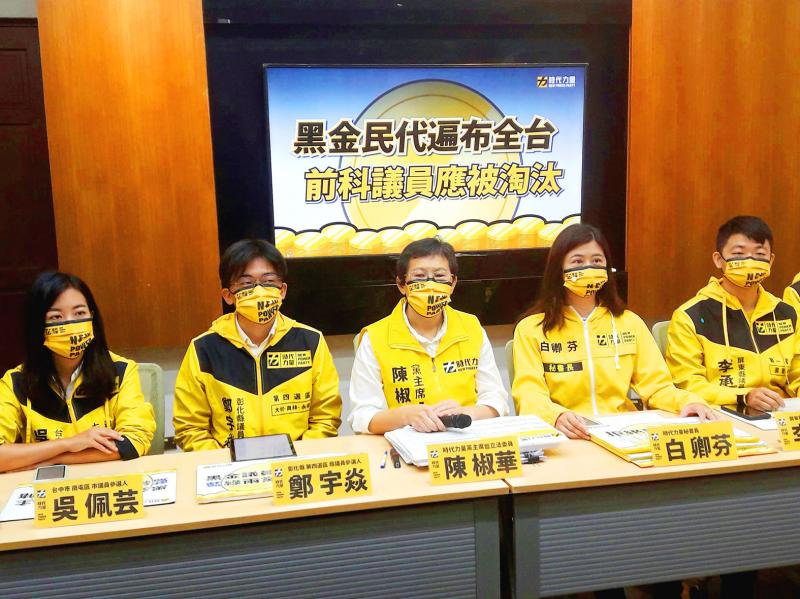New Power Party (NPP) members on Friday called on the public to sweep out “black gold” politicians in the year-end local elections, referring to politicians who have wealth wealth from dubious sources or connections with organized crime.
They said that many local councilors running for re-election have been charged with or convicted of corruption, vote-buying, embezzling public funds or gang-related crimes.
“Most people are concerned about ‘black gold’ influence in the upcoming campaign for local council seats, and do not want political parties nominating people who have been indicted or who have criminal records,” NPP chairwoman and legislator Chen Jiau-hua (陳椒華) said at a news conference at the legislature in Taipei.

Photo: CNA
Chen was joined by NPP council candidates, most of whom are under 30, in a demand for “clean elections.”
There are many “black gold” politicians in Taiwan, having been accused of corruption, vote-buying, bid-rigging or funding projects based on financial connections, they said.
“We demand that not just the Democratic Progressive Party (DPP) and the Chinese Nationalist Party (KMT), but also smaller parties, uphold moral standards when selecting candidates for local elections,” Chen said.
She and NPP members displayed data collected from courts and prosecutors’ offices showing that since 2018, 51 KMT and 25 DPP councilors have been prosecuted for or convicted of corruption, including vote-buying or embezzlement, along with 27 councilors of no party affiliation.
“These accounted for 12.4 percent of all city and county councilors in Taiwan,” Chen said, adding that the data presented do not include campaign managers or neighborhood representatives who faced similar convictions.
Some of the cases mentioned by Chen and the NPP members involved taking bribes from contractors, embezzlement of public funds, bid rigging, illegal land grabs and colluding to profit from property development and government projects.
Regarding the six special municipalities, Chen said that Kaohsiung, New Taipei City and Taoyuan have the highest ratio of councilors being prosecuted or who have convictions, at 25 percent, 17 percent and 15 percent respectively.
NPP members cited a survey released last week by Taiwan People News showing that 60.6 percent of the public agreed that “black gold” influence in local politics is a serious problem, rising from 50 percent in a previous survey.
Additionally, about 61 percent are not satisfied with the government’s efforts to crack down on black gold politicians, they said.

‘DENIAL DEFENSE’: The US would increase its military presence with uncrewed ships, and submarines, while boosting defense in the Indo-Pacific, a Pete Hegseth memo said The US is reorienting its military strategy to focus primarily on deterring a potential Chinese invasion of Taiwan, a memo signed by US Secretary of Defense Pete Hegseth showed. The memo also called on Taiwan to increase its defense spending. The document, known as the “Interim National Defense Strategic Guidance,” was distributed this month and detailed the national defense plans of US President Donald Trump’s administration, an article in the Washington Post said on Saturday. It outlines how the US can prepare for a potential war with China and defend itself from threats in the “near abroad,” including Greenland and the Panama

The High Prosecutors’ Office yesterday withdrew an appeal against the acquittal of a former bank manager 22 years after his death, marking Taiwan’s first instance of prosecutors rendering posthumous justice to a wrongfully convicted defendant. Chu Ching-en (諸慶恩) — formerly a manager at the Taipei branch of BNP Paribas — was in 1999 accused by Weng Mao-chung (翁茂鍾), then-president of Chia Her Industrial Co, of forging a request for a fixed deposit of US$10 million by I-Hwa Industrial Co, a subsidiary of Chia Her, which was used as collateral. Chu was ruled not guilty in the first trial, but was found guilty

A wild live dugong was found in Taiwan for the first time in 88 years, after it was accidentally caught by a fisher’s net on Tuesday in Yilan County’s Fenniaolin (粉鳥林). This is the first sighting of the species in Taiwan since 1937, having already been considered “extinct” in the country and considered as “vulnerable” by the International Union for Conservation of Nature. A fisher surnamed Chen (陳) went to Fenniaolin to collect the fish in his netting, but instead caught a 3m long, 500kg dugong. The fisher released the animal back into the wild, not realizing it was an endangered species at

DEADLOCK: As the commission is unable to forum a quorum to review license renewal applications, the channel operators are not at fault and can air past their license date The National Communications Commission (NCC) yesterday said that the Public Television Service (PTS) and 36 other television and radio broadcasters could continue airing, despite the commission’s inability to meet a quorum to review their license renewal applications. The licenses of PTS and the other channels are set to expire between this month and June. The National Communications Commission Organization Act (國家通訊傳播委員會組織法) stipulates that the commission must meet the mandated quorum of four to hold a valid meeting. The seven-member commission currently has only three commissioners. “We have informed the channel operators of the progress we have made in reviewing their license renewal applications, and